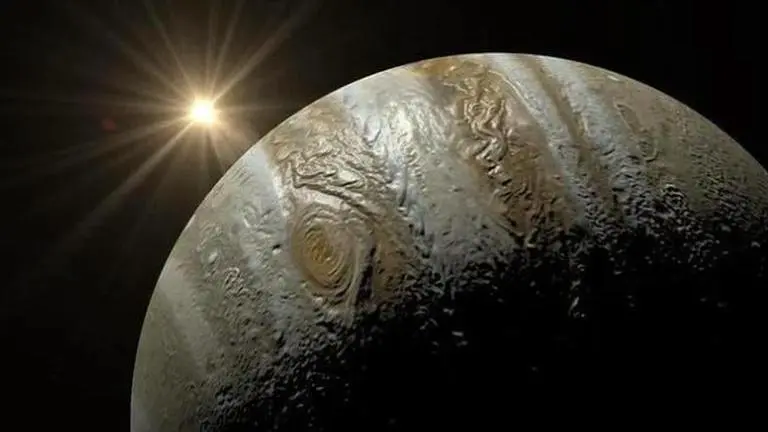Updated 10 April 2023 at 07:06 IST
ESA led JUICE spacecraft to fly on 8 year mission to find signs of life on Jupiter
European Space Agency is set to embark on a new page to search for signs of extraterrestrial life elsewhere on Jupiter in the universe other than Mars.
- Science News
- 3 min read

European mission worth £1.4 billion is set to be blasted off into space on an eight-year mission to find signs of life on Jupiter and its icy moons. European Space Agency is set to embark on a new page to search for signs of extraterrestrial life elsewhere in the universe other than Mars. Jupiter Icy Moons Explorer - or Juice - will be on an expedition to find where in the solar system the greatest reserves of water exist far from the Earth. It will orbit around the giant planets Jupiter and Saturn in its first mission to be launched to explore the unseen.
“What we’ve learned on Earth is where you find water, you quite often find life,” Mark Fox-Powell from the Open University in England told Scientific American. “When we look out in the solar system, places that have [liquid] water in the present day are really restricted to Earth, and the moons of Jupiter and Saturn," he explained.
Olivier Witasse, the mission’s project scientist, meanwhile was reported saying that the scientists would "like to see whether there are places around Jupiter where life could have started." Furthermore, he elaborated that "We need to find a place with internal energy and liquid water. With the icy moons of Jupiter, we have good reasons to believe that there is more water than on Earth.” Previously the US space missions have discovered the intricate details on the three of Jupiter’s main moons – Ganymede, Callisto and Europa – which were found to be covered with thick ice and vast oceans of liquid water. This, as per the scientists, could be a sign of the existence of life.
Credit: ESA/CNES/Arianespace/PA
JUICE is to be launched on Thursday, April 13
In its quest to find out more, the European Space Agency (ESA)-led Jupiter Icy Moons Explorer spacecraft, or JUICE will be launched on Thursday, April 13, from Europe's Spaceport in French Guiana. The mission will be packed with ESA described as "the most powerful payload ever flown to the outer solar system." This payload will be sent onboard the Ariane 5 rocket that will fly it to space. “If ever there was a next-best place to look for life, it’s here,” US astronomer Neil deGrasse Tyson was quoted saying to Guardian about Jupiter's moons. JUICE will enter orbit around Jupiter in July 2031 and will parallel another mission NASA’s Europa Clipper, which will use the flybys of Earth and Mars for a shorter route and will arrive in April 2030.
Advertisement
Credit: ESA/ATG
“Europa’s ocean is likely in contact with a rocky seafloor,” Marshall Styczinski, a Europa Clipper scientist was reported saying.
“That means we expect chemical reactions that would create hydrothermal vents, like in Earth’s oceans. Hydrothermal vents support thriving ecosystems on Earth, so they might be doing the same on Europa.”
Published By : Digital Desk
Published On: 10 April 2023 at 07:06 IST


